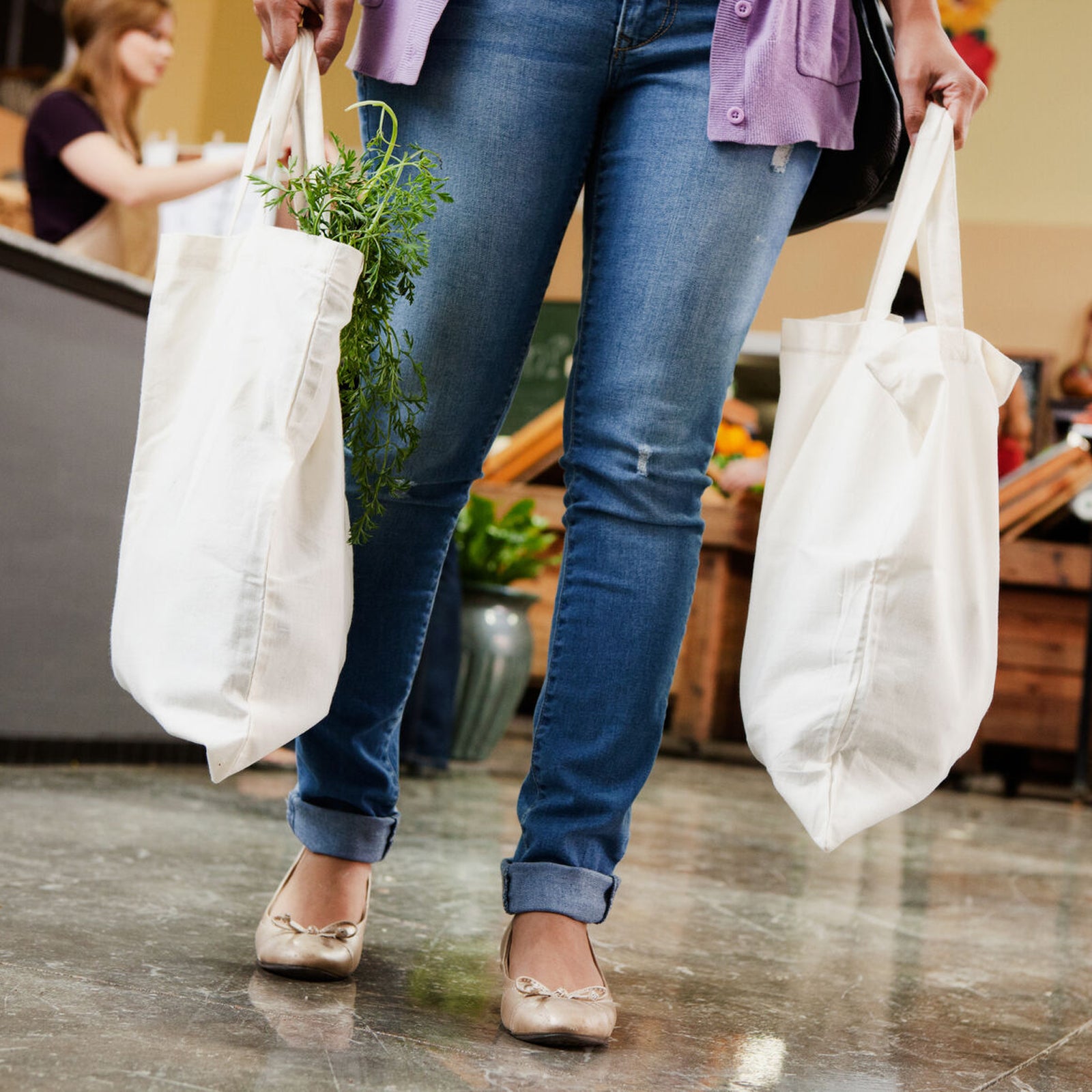Over the past few months, I’ve written about reducing plastic consumption and cutting back on food waste. I’ve looked at ways to combat antibiotic resistance and appealed to folks to swap out tuna nigiri for vegan sushi. But sometimes it feels like the tide of bad environmental news is so crushing that it’s easier to let the weight pull you under instead of fighting against the current. Which made me wonder: If you’re not supposed to swim against a riptide, is there a better, smarter way to paddle out of this predicament?��
Changing consumer behavior is tricky, in part because our brains are on autopilot a lot of the time, says Kai Wright, author of ��and a lecturer at Columbia University. That’s why you jump out of your car at the grocery store without thinking twice about your reusable bags. To successfully alter behavior, we have to kick people off autopilot and get them using their brains, he adds.
There are two things people need to start the process of changing their behavior, says Wright: one is motivation��and the other is ability. He points to something called the��, a theory put forward by psychologists in the 1980s that says the closer or more affected you are by something, the more motivated you’ll be to change your behavior.
Unfortunately, the environment is one of those things where it’s hard not to fall into a trap called present bias,��says Wright. “In the case of the environment, the thought is, we have to stop doing things now so that in 10��years, 20��years, 30 years, we’ll have a planet,” he explains. The problem is that people are not particularly good at weighing choices where one outcome doesn’t happen for a significant amount of time.��So that’s step one: getting people to feel like something is personally affecting them, even though they may not be feeling it right at this moment.��
Step two is��making it easy for people to change their behavior. This is where even the most eco-conscious person gets tripped up. Because even if you bring reusable bags, it’s difficult to buy groceries without also getting plastic boxes of lettuce or cups of soy yogurt.��
If you’re not supposed to swim against a riptide, is there a better, smarter way to paddle out of this predicament?
Wright says that in moments like these, it’s often some entity, either a corporation or the government, that steps in to help incentivize the right choice. “In the case of plastic bags, it was a tax��and making another option—a paper bag or a bag you can recycle for a dollar or two dollars—available,” he says.
Think back to the most successful environmental campaigns of the eighties��and nineties. First��there were chlorofluorocarbons (CFCs), which scientists identified as a potential cause of our ozone hole. In just over a decade, governments banned CFCs in aerosol products. Then came curbside recycling, where local municipalities provided bins and built sorting centers. In both cases, governments—federal and local—played a pretty crucial role in making the virtuous decisions easy.��
But those things didn’t happen without a fight. Cisco DeVries, the CEO of a company called����that encourages responsible energy use in California, worked on energy policy during the Clinton administration. He can recount numerous battles over curbside recycling. “Woodbury, New Jersey, was the first city to do curbside recycling, in 1980. And when the mayor pushed it through, residents were so mad they threw trash on his lawn,” says DeVries.��
I asked DeVries if things are actually more fractious now than they’ve ever been, or if it just feels that way. Take the plastic-straw bans, which popped up in a handful of cities like Seattle and Malibu, California, in 2018. While there were very valid concerns from many about how these bans would affect the disabled,��the issue��also became a punching bag for conservative politicians and pundits. But DeVries says that, actually, new environmental rules have pretty much always caused an��outcry, both from those who think they go too far and from those who feel they don’t go far enough. “No matter where you start, people will resist,” DeVries says. However, people adjust, which is why it now feels routine to separate your recyclables out from your trash.��
But how do we get to that new normal? Peer pressure.��
One thing curbside recycling had going for it was that it was highly visible, DeVries says. Recycling centers existed before, but you had to take your paper and cans to them—and no one saw you doing it. Curbside bins were another matter. “You did not want to be the last schmuck on your block who was not using their bins,” he says.��
In his book, Wright writes about the importance of community in inspiring behavioral shifts. “Members of a community like to mirror each other,” he says. Wright points to a����published in the��Journal of Consumer Research��in 2008. To get people to try and recycle their towels at a hotel, researchers tried two methods:��the first included signs saying just how much energy and water was saved by reusing towels; the other used signs touting that seven out of ten guests chose the eco-friendly option. In the end, it was the second approach that proved more effective at getting guests��to reuse their towels. Humans, it turns out, just kind of want to be a part of the herd.
But every herd needs a leader. Government cannot and should not be the only entity moving environmental policy forward, DeVries says. That’s in part��because people hate the government telling them what to do. “It’s a mistake to say government can solve this by snapping its fingers. But it’s also a mistake to say that just the markets can do this��or people will do it out of their��own goodwill. You need a combination of these things.”��
One encouraging example of an entity trying to drive changes in consumer behavior is REI, the outdoor retail giant. Four years ago, the company had success modifying consumer behavior with its #Opt�����ԹϺ��� campaign. It closed stores on Black Friday and encouraged employees and patrons to go hike, bike, and climb instead of shopping. People did. But that campaign was a pretty light lift: after all, REI’s customers don’t need much convincing to go play.��
Ben Steele, REI’s chief customer officer, attributes the campaign’s success to a few key variables. The company pays its employees for Black Friday, despite being closed, letting them lead the way. Had REI launched the hashtag and not given its��employees the freedom to run wild, Steele thinks the campaign wouldn’t have had the success it did. But the campaign did another thing really well: it used a hashtag to show people around the world actually committing to changing their behavior, even for just a day.��
Humans, it turns out, just kind of want to be a part of the herd. But every herd needs a leader.
Steele says that, with REI’s massive platform, he feels a sense of obligation to push that movement forward. Now��the company is trying to further change consumer behavior on issues like waste and thoughtful consumption. This year its #Opt�����ԹϺ��� mission is also challenging employees and the public to . The idea is to encourage customers to spend the next year reducing their impact on the planet.��
REI is starting this initiative in��its stores and with its e-commerce business. First, it’s piloting a , so you can sell that puffy you haven’t worn in years. Next, it’s going to work on reducing plastic packaging and having several stores become zero-waste operations.��
Will it work? Maybe. It’s definitely a plus when corporations like REI shoulder some of the weight needed for big, structural changes. In addition to that, the rest of us should keep pressuring brands, governments, and NGOs to work toward��structural solutions that make the right choices easy and the wrong choices hard.��
While we wait for that kind of change, your small individual actions are essential. Buying new stuff is never the greenest option, but consider gifting reusable bags, water bottles, and take-out kits this holiday season. Keep bringing your own mug, and don’t be afraid to create a scene if a coffee shop doesn’t want to fill it. Show up with your cloth bags, even if you’re the only one doing it. Then��maybe someone in your community will start to mirror you. And someone may mirror them. Pretty soon, you’re leading your own little herd.


